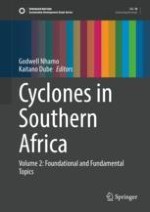
2021 | OriginalPaper | Chapter
1. Tropical Cyclones as an Emerging Global Disaster Risk and Management Issue
Authors : Kaitano Dube, Godwell Nhamo
Published in: Cyclones in Southern Africa
Publisher: Springer International Publishing
Activate our intelligent search to find suitable subject content or patents.
Select sections of text to find matching patents with Artificial Intelligence. powered by
Select sections of text to find additional relevant content using AI-assisted search. powered by